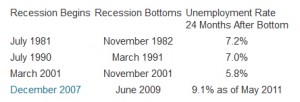By Dan Steinhart, Casey Research US corporations are sitting on more cash than at any point since World War 2. That's without including banks. I'm only talking about non-financial corporations – the ones that sell goods and services and make the economy go. Those businesses hold $1.4 trillion. In absolute terms, that's the most ever. In relative terms, it's the most since World War II. As investors, we can infer quite a bit from corporations' inability (or unwillingness) to deploy their cash. For one, it indicates that business have assumed a very defensive stance. Cash, of course, is a buffer against uncertainty - the uncertainty that business slows for any reason. … [Read more...]
The US Economy Puzzle- Is the U.S. Really Capitalist?
Is the United States really a "free market" economy and the bastion of "capitalism" as we claim? Or is it a Bureaucratic mess? Is it a "command economy"? Obviously we haven't reached the depths of socialism or communism that China and Russia reached before their fall and reemergence as capitalists but none-the-less our economy is not as free as it once was. There is burdensome regulations that prevent competition, political cronyism, corruption, and as David Galland contends in the following article "Europe and the economy of the United States is – and has been for decades – increasingly under the control of central planners at the expense of the free market." ~ Tim McMahon, editor The … [Read more...]
What is the Fiscal Cliff and How is it Affecting the Economy
The fiscal cliff that is the current hot topic in the news is a combination of automatic spending cuts and tax hikes that are scheduled to go into effect at the end of 2012 and the beginning of 2013. The spending cuts were triggered when congress failed to reach a deficit reduction agreement during last years debt ceiling debate. The tax increases are also automatic because Congress failed to make the "Bush Tax Cuts" permanent opting instead for a more politically expedient temporary tax reduction. In other words, they "kicked the can down the road" and it landed at the end of 2012. Perhaps they were hoping the Mayans were right and the world would end before they had to deal with the … [Read more...]
4 Practical Ways to Keep Your Small Business Profitable during a Recession
Small Business Big Profits Recession is a word that strikes fear into the heart of many small business owners and investors, and for good reason. Reports indicate that the number of failing small businesses drastically increased during the recent recession, and many are still in the process of recovering from insolvency due to the economic backlash. Although a recession certainly decreases the overall demand for products because consumers have less money to spend, there are certain companies in almost every industry that find a way to not only survive but thrive during these harsh financial times. Creatively Outdo Competitors to Increase Profits When people have less money to spend they … [Read more...]
Why Deficits Are Politically Convenient
Terry Coxon of Casey Research discusses the effects of deficits on the economy and politics. ~editor Deficits: How Far to the Wall? By Terry Coxon, Casey Research Decades of manipulation by the Federal Reserve (through its creation of paper money) and by Congress (through its taxing and spending) have pushed the US economy into a circumstance that can't be sustained but from which there is no graceful exit. With few exceptions, all of the noble souls who chose a career in "public service" and who've advanced to be voting members of Congress are committed to chronic deficits, though they deny it. For political purposes, deficits work. The people whose wishes come true through the … [Read more...]
Adam Fergusson: “Inflating your economy means playing with fire”
GoldMoney founder James Turk interviews When Money Dies author Adam Fergusson, who discusses the parallels and differences between the Weimar inflation and the situation in the US and Europe today. "I don't see how any of these [Western] economies can grow their way out of the extraordinary debts that they have." … [Read more...]
How Does Inflation Affect You?
When people go the the grocery store and see ever higher prices they know how inflation affects them. But when they are feeling more philosophical they might reason that if all wages and prices increased at the same rate it would all balance out in the end right? Well theoretically yes but in reality it never works that way. Prices of various items all increase at different rates so some people are benefiting while others suffer. Those on fixed incomes suffer the most because the cost of things they are buying increases but their income stays the same. This is where COLA or "Cost Of Living Allowance" comes in it is an adjustment that is made to compensate for the increase in prices due … [Read more...]
The Way Out of Our Economic Mess
By Terry Coxon, Casey Research "A rock and a hard place" is a long-running theme of Casey Research publications. It refers to the dilemma the US government has wandered into with its continued policy of rescue inflation. The "rock" is what will happen if the Fed pauses for long in printing still more money – the collapse of an economy burdened by an accumulation of mistakes that rescue inflation has been keeping at bay. The "hard place" is the disruptive price inflation that becomes more likely (and likely more severe) with every new dollar the Fed prints to keep the effects of those mistakes suppressed. When the dollar was cut loose from the gold standard in 1971, the Federal Reserve … [Read more...]
Recession Watch- Where are We Now?
Recessions are generally caused by a shrinking money supply and/or an increase in demand for cash. In the last two years the M1 money supply has grown by 40% and still the economy is weak, the unemployment rate is high... basically no recovery. Why? In this article Terry Coxon discusses the slow recovery and how it compares to previous recessions. ~Tim McMahon, editor Economically Sleepwalking Terry Coxon, Senior Economist Until the Great Depression of the 1930s, the average length of a recession was 21 months. The misery that began in October 1929 lasted five times that long – 105 months.... the government pursued an array of policies to prevent prices from falling, which had the … [Read more...]
Five Things You Need to Know About the Economy
By David Galland, Managing Director, Casey Research At any point during the recent negotiations in Washington over the debt, did you seriously think for even a second that the U.S. was about to default? Of course, in time the U.S. government (along with many others) will default. However, they are highly unlikely to do so by decree or even through the sort of legislative inaction recently on display. Rather, it will come about through the time-honored tradition of screwing debtors via the slow-roasting method of monetary inflation. Yet most people still bought into the latest drama put on by the Congressional Players – a troupe of actors whose skills at pretense and artifice might … [Read more...]




